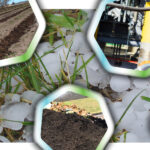
Nora Goldstein
BioCycle October 2018
The International Panel on Climate Change (IPCC) released a special report on October 8 — Global Warming of 1.5°C — that for all intents and purposes is the world’s final warning to act now or forever suffer the consequences. “With clear benefits to people and natural ecosystems, limiting global warming to 1.5°C compared to 2°C could go hand in hand with ensuring a more sustainable and equitable society,” noted Panmao Zhai, Co-chair of IPCC Working Group I. “One of the key messages that comes out very strongly from this report is that we are already seeing the consequences of 1°C of global warming through more extreme weather, rising sea levels and diminishing Arctic sea ice, among other changes.”
The report highlights a number of climate change impacts that could be avoided by limiting global warming to 1.5°C compared to 2°C, or more. For instance, by 2100, global sea level rise would be 10 cm (3.9 inches) lower; the likelihood of an Arctic Ocean free of sea ice in summer would be once per century (compared with at least once per decade with 2°C); and coral reefs would decline by 70 to 90 percent, whereas virtually all (>99 percent) would be lost with 2°C.
“The good news is that some of the kinds of actions that would be needed to limit global warming to 1.5°C are already underway around the world, but they would need to accelerate,” said Valerie Masson-Delmotte, Cochair of Working Group I. The report finds that limiting global warming to 1.5°C would require “rapid and far-reaching” transitions in land, energy, industry, buildings, transport, and cities. Allowing the global temperature to temporarily exceed or “overshoot” 1.5°C “would mean a greater reliance on techniques that remove CO2 from the air to return global temperature to below 1.5°C by 2100. …. The effectiveness of such techniques is unproven at large scale and some may carry significant risks for sustainable development.”
The kinds of actions that are already underway to limit global warming to 1.5°C are totally proven and ready to be accelerated and scaled. The most significant barriers today are tied up in certain existing industries (and their well-financed and politically connected stakeholder groups) that are resistant to change because of their vested interest in business as usual.
The organics recycling sector is hands-on in the six areas that the IPCC lists as requiring “rapid and far-reaching” transitions. Let’s take inventory (this list is just a start):
Land — Recycling organics, e.g., compost, digestate and biosolids, back to land to sequester carbon, build drought resistance, add nutrients, infiltrate storm water, etc.
Energy — Anaerobic digester biogas to generate power, renewable natural gas and thermal heat; Composting heat recovery to replace fossil-fuel use.
Industry — Utilization of digester biogas and heat recovery (see article on K.B. Specialty Foods starting on p. 34); Tools to help achieve zero waste operations.
Buildings — On-site wastewater treatment and water recycling; Organics diversion; Green infrastructure.
Transport — Renewable natural gas to vehicle fuels; Also biogas to electricity for electric vehicles.
Cities — All of the above, and more, including composting and AD, green infrastructure, urban farming and community composting, contaminated soil remediation, codigestion, etc.
Kudos to all for advancing these “transitions” that measurably contribute to reducing global warming to 1.5°C. We have heeded the warning (and have for decades), and stand ready to scale.









